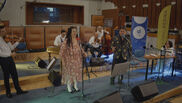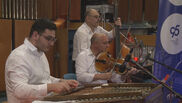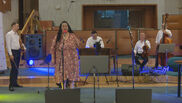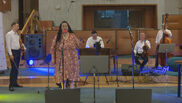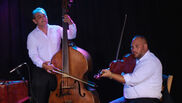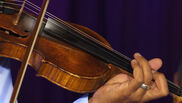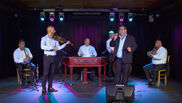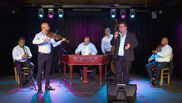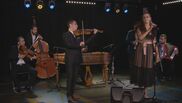The Sendreis Gypsy Band - I got Drunk
created: 17. 06. 2025 13:40 modified: 17. 06. 2025 13:41
The founders of the Sendreiovci Gypsy Band are Vladimír Sendrei and his wife Jana Sendreiová. They founded the Band in 2001 in the village of Kokava nad Rimavicou, the band's original name was Kokavakere lavutara. Their work caught the attention of film music composer Hans Zimmer and became part of the soundtrack of the film Sherlock Holmes: A Game of Shadows. The Band's music also enriched the soundtrack of the Czech film titled Roming.
Jana Sendreiová achieved her personal success when in 2005 she performed together with other soloists at a concert in New York at Carnegie Hall, accompanied by the Roma band Anyalai Gypsy Band.
The song Maťiľom was presented on 9.4.2024 during an event from the Live Books series, which took place on the occasion of World Roma Day at RTVS, the Big Studio of Slovak Radio in Košice.
category: music
tags: vocal-instrumental modern folk orchestra borrowed Romani Sendreiovci Gypsy Band general audience internal
The Sendreis Gypsy Band - Not a Single Musician
created: 17. 06. 2025 12:08 modified: 17. 06. 2025 12:09
The founders of the Sendreiovci Gypsy Band are Vladimír Sendrei and his wife Jana Sendreiová. They founded the Band in 2001 in the village of Kokava nad Rimavicou, the band's original name was Kokavakere lavutara. Their work caught the attention of film music composer Hans Zimmer and became part of the soundtrack of the film Sherlock Holmes: A Game of Shadows. The Band's music also enriched the soundtrack of the Czech film titled Roming.
Jana Sendreiová achieved her personal success when in 2005 she performed together with other soloists at a concert in New York at Carnegie Hall, accompanied by the Roma band Anyalai Gypsy Band.
The song Maťiľom was presented on 9.4.2024 during an event from the Live Books series, which took place on the occasion of World Roma Day at RTVS, the Big Studio of Slovak Radio in Košice.
category: music
tags: vocal-instrumental modern folk orchestra borrowed Romani Sendreiovci Gypsy Band general audience internal
The Sendreis Gypsy Band - I am Black, I am Black
created: 17. 06. 2025 10:28 modified: 17. 06. 2025 10:28
The founders of the Sendreiovci Gypsy Band are Vladimír Sendrei and his wife Jana Sendreiová. They founded the Band in 2001 in the village of Kokava nad Rimavicou, the band's original name was Kokavakere lavutara. Their work caught the attention of film music composer Hans Zimmer and became part of the soundtrack of the film Sherlock Holmes: A Game of Shadows. The Band's music also enriched the soundtrack of the Czech film titled Roming.
Jana Sendreiová achieved her personal success when in 2005 she performed together with other soloists at a concert in New York at Carnegie Hall, accompanied by the Roma band Anyalai Gypsy Band.
The song Kaľi som, kaľi som was presented on 9.4.2024 during an event from the Live Books series, which took place on the occasion of World Roma Day at RTVS, the Big Studio of Slovak Radio in Košice.
category: music
tags: vocal-instrumental modern folk orchestra borrowed Romani Sendreiovci Gypsy Band general audience internal
The Sendreis Gypsy Band - Her Hair / You, Girl
created: 17. 06. 2025 07:56 modified: 17. 06. 2025 07:57
The founders of the Sendreiovci Gypsy Band are Vladimír Sendrei and his wife Jana Sendreiová. They founded the Band in 2001 in the village of Kokava nad Rimavicou, the band's original name was Kokavakere lavutara. Their work caught the attention of film music composer Hans Zimmer and became part of the soundtrack of the film Sherlock Holmes: A Game of Shadows. The Band's music also enriched the soundtrack of the Czech film titled Roming.
Jana Sendreiová achieved her personal success when in 2005 she performed together with other soloists at a concert in New York at Carnegie Hall, accompanied by the Roma band Anyalai Gypsy Band.
The songs Lakere bala and U tu čhaje were presented on 9.4.2024 during an event from the Live Books series, which took place on the occasion of World Roma Day at RTVS, the Big Studio of Slovak Radio in Košice.
category: music
tags: vocal-instrumental modern folk orchestra borrowed Romani Sendreiovci Gypsy Band general audience internal
My heart aches, my head hurts too - Roland Horváth Orchestra
created: 13. 08. 2024 14:19 modified: 13. 08. 2024 14:19
The Roma dulcimer band Roland Horváth Orchestra performs traditional Roma music from Slovakia and Hungary. The line-up is international, the musicians come from both Slovakia and Hungary, the bandleader is a clarinetist Roland Horváth.
The vocal-instrumental composition is called My heart aches, my head hurts too. The song was sung by Dušan Deme. The author of the original lyrics and music is unknown.
category: music
tags: vocal-instrumental modern folk sextet borrowed Romani Roland Horváth Orchestra general audience internal
I Drink and Sing - Roland Horváth Orchestra
created: 13. 08. 2024 12:28 modified: 21. 08. 2024 10:01
The Roma dulcimer band Roland Horváth Orchestra performs traditional Roma music from Slovakia and Hungary. The line-up is international, the musicians come from both Slovakia and Hungary, the bandleader is a clarinetist Roland Horváth.
The vocal-instrumental composition is called Me čak pijav, mulatinav. The song was sung by Dušan Deme. The author of the original lyrics and music is unknown.
category: music
tags: vocal-instrumental modern folk sextet borrowed Romani Roland Horváth Orchestra general audience internal
My Sweet Mum Was Right - Roland Horváth Orchestra
created: 13. 08. 2024 10:28 modified: 21. 08. 2024 07:40
The Roma dulcimer band Roland Horváth Orchestra performs traditional Roma music from Slovakia and Hungary. The line-up is international, the musicians come from both Slovakia and Hungary, the bandleader is a clarinetist Roland Horváth.
The vocal-instrumental composition is called Mištes mange mri guľi daj phenďa. The song was sung by Dušan Deme. The author of the original lyrics and music is unknown.
category: music
tags: vocal-instrumental modern folk sextet borrowed Romani Roland Horváth Orchestra general audience internal
Everything is lost - Roland Horváth Orchestra
created: 13. 08. 2024 09:01 modified: 13. 08. 2024 09:02
The Roma dulcimer band Roland Horváth Orchestra performs traditional Roma music from Slovakia and Hungary. The line-up is international, the musicians come from both Slovakia and Hungary, the bandleader is a clarinetist Roland Horváth. The vocal-instrumental composition is called Everything is lost.The song was sung by Dušan Deme.
category: music
tags: vocal-instrumental modern folk sextet borrowed Slovak Roland Horváth Orchestra general audience internal
The Sad Sunday - Roland Horváth Orchestra
created: 13. 08. 2024 07:19 modified: 13. 08. 2024 07:20
The Roma dulcimer band Roland Horváth Orchestra performs traditional Roma music from Slovakia and Hungary. The line-up is international, the musicians come from both Slovakia and Hungary, the bandleader is a clarinetist Roland Horváth.
The vocal-instrumental composition is called The Sad Sunday. It is a Slovak version of the original Hungarian tragic song Szomorú vasárnap from 1933, composed by Seress Rezső (1899-1968).
The Slovak version of the song was sung by Dušan Deme.
category: music
tags: vocal-instrumental modern folk sextet borrowed Slovak Roland Horváth Orchestra general audience internal
Ďusi Band Orchestra - The Songs: Don't Follow me, My Girl / What Shall I Do, Lord
created: 01. 07. 2024 07:08 modified: 01. 07. 2024 07:11
The family cimbalom band Ďusi Band core members are the father and his three sons, often accompanied by various guest musicians. The singer Anita Haffnerova and the Band sang the songs Maphir pal ma, čhajori / So me, Devla (Don't Come After Me, Girl / What I, My Lord). The guest musicians of the Band were Roland Horvath - clarinet and Jakub Haffner - accordion and vocals.
The video was recorded in the framework of the internal project of documentation of the family cimbalom bands, in Presov, in 2022.
category: music
tags: vocal-instrumental modern folk orchestra borrowed Romani Ďusi Band Orchestra general audience internal




